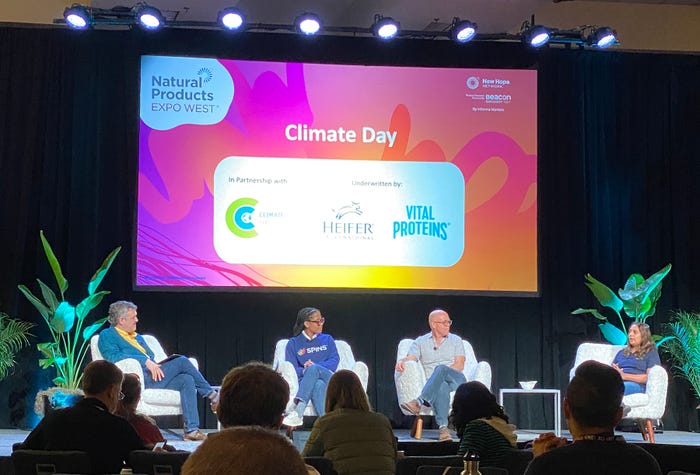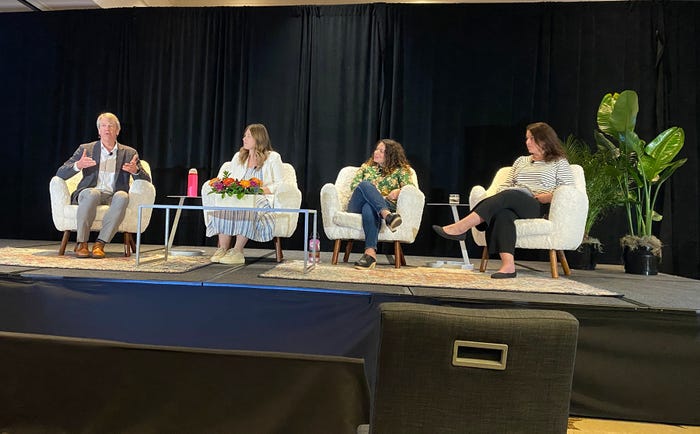Several key takeaways amplify regeneration at Expo West’s ‘Climate Day’
Launched at Natural Products Expo West in 2017 by the Climate Collaborative, “Climate Day" now serves as a major draw at the annual show in Anaheim, California.

At a Glance
- The popularity of Climate Day at Expo West is proof positive that sustainability is no longer a fad, it's the future.
- This year's event featured industry leaders discussing issues like regenerative agriculture, building stronger supply chains.
- Sharing best practices and building strong partnerships will be crucial in moving the industry forward.
New Hope added “Climate Day” to Natural Products Expo West’s lineup in 2017. “There were only 70 people who showed up for it,” Carlotta Mast, senior vice president, New Hope, said. “Now, every event surrounding Climate Day has hundreds in attendance.”
The daylong event, executed by the Climate Collaborative, is the official kickoff program for Expo West. It’s an opportunity for the show’s attendees to join industry leaders for relevant keynote addresses, executive roundtable discussions, workshops, networking and more.
The roundtable discussions during this year’s event served as catalysts to bring about real industry change. First, Climate Collaborative’s Courtney Pineau set the tone with the engaging breakfast session, “The Time Is Now: Building a Climate Action Movement.”
That was followed by “Delivering Value Beyond the Soil: The Case for an Organic & Regenerative Agricultural System,” moderated by Merryfield’s Joe Dickson with Jessica Wright (SPINS), Ryan Zinn (Dr. Bronner's) and Sonali Pandithasekara (Serendipol) as panelists. They discussed, among many issues, ecosystems, biodiversity and paying farmers a fair wage.
One of the biggest takeaways from this panel was Zinn’s position on building stronger infrastructures to be able to properly handle supply chains. It’s a collaborative effort, stressed the regenerative projects manager for Dr. Bronner’s.
“We need to really build up infrastructures to be able to accommodate and build supply chains that reflect those values within the regenerative organic conversation,” he said.

“At Dr. Bronner’s, to be able to support and accommodate all of the farmers that we work with, we began to launch programs that really kind of diverted into three categories,” Zinn continued. “We've really been diverging coconut oil and the coconut palm. We've also launched a chocolate mine as well to be able to support those farmers as they transition their organic, their regenerative and their cocoa as well.
“So building out that infrastructure is not a small task. I think as we look towards the future … diversification and collaboration really are the order of the day. The more we can figure out how to facilitate that, the better off we'll be.”
More companies take action
A mid-morning panel, “Working at the Intersection of Climate & Nature: The Opportunities & Challenges Companies are Facing Accounting for Their Efforts,” picked up where Zinn left off. Moderated by Tim Greiner (Pure Strategies), it featured Caitlin Leibert (Whole Foods Market), Jessica Rosen (Guayaki Yerba Mate) and Nicole Rakobitsch (Organic Valley).
There were several key takeaways the panelists wanted the audience to consider. First, Greiner stressed the importance of tackling climate and nature simultaneously.
“These two things really depend on each other,” he said. “Success in climate is predicated on success in nature … if we don't somehow protect, restore and sustainably manage ecosystems, then we're not going to have the resilient farm and nature services that are needed for us to manage our way through what is a really devastating future, a potential future that we're all facing.”
Industry veteran Rakobitsch spoke first. She recently hit a milestone with a carbon incentive program she designed at organic food brand Organic Valley. She explained how the program, which helps farmer owners install new practices that either reduce greenhouse gas emissions or sequester carbon, fits within the company’s overall climate strategy.

“We've been on this journey for the last two years, really doing our due diligence and building a scientifically robust program, building the science, the protocol, engaging with our farmers to make sure it's a program that will work for them,” Rakobitsch said. “We are a farmer-owned cooperative, so without farmers engaged, we won't be successful.” The farmers focus on practices such as improved manure management, seed supplements, and tree plantings, or agroforestry. The farmers receive annual carbon payments for their efforts.
In addition, Rosen shared how Guayaki Yerba Mate has supported farmers who are implementing agroforestry practices. The company sources certified regenerative, organic and fair trade yerba mate in South America for its traditional loose leaf mate as well as ready-to-drink beverages.
“We work in really close, long-term partnership with our yerba mate producers and harvesters,” Rosen said. Conventional yerba mate, she continued, is typically grown under full sun monoculture or a traditional kind of commodity row crop. Guayaki sources shade-grown mate.
“It grows using regenerative agroforestry practices and helps regenerate the soil, as well as preserve the canopy and above-ground biomass in the Atlantic Forest,” she explained. “We've all heard about the Amazon Rainforest, but the Atlantic Forest is also another globally significant biodiversity hotspot, home to many endemic species and threatened species around the world.
"When our company was founded, our founders really believed in using businesses for good and really starting with the production of our mate and growing mate differently to encourage this conservation and restoration of the Atlantic Forest, as well as producing high quality, regenerative, shade-grown mate.”
With the help of local producers and harvesters, Guayaki developed its own shade-grown yerba mate production standard. “We have the first regenerative organic certified yerba mate in the world, which we're very proud of, as well as organic, of course, and fair trade,” she said. “It's something we're in the process of getting third-party validated and we want to open source [it] so that the rest of the yerba mate industry can use it.”
These are conversations that will continue to evolve.
About the Author(s)
You May Also Like






